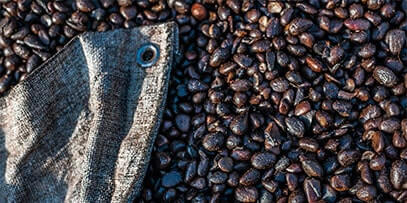Coffee and tea are Rwanda’s largest agricultural exports, but while most tea is grown on large plantations, coffee is produced by thousands of smallholder farmers whose livelihoods depend on their crop. Coffee exports, therefore, can really make a difference to the lives of Rwandan farmers
Connecting business to business and boosting Rwanda’s exports
“We love Rwandan coffee,” a Rwandan newspaper quoted a Starbucks vice-president as saying when he visited the country in May 2015. The executive and his team, apparently there to negotiate an increased order, had just paid a courtesy call to President Paul Kagame – a hint perhaps of the importance of coffee exports to the Rwandan economy.
Coffee and tea are Rwanda’s largest agricultural exports, but while most tea is grown on large plantations, coffee is produced by thousands of smallholder farmers whose livelihoods depend on their crop. Coffee exports, therefore, can really make a difference to the lives of Rwandan farmers.
According to Rwanda’s National Agriculture and Export Development Board (NAEB), in 2014 Rwanda’s green (unroasted) coffee exports were worth almost US$60 million, up on the previous year and buoyed by good global prices.
Buyers generally prefer green coffee, allowing them to roast and blend to their own specifications. However, while a container of green beans is sold for about US$8,000, a container of roasted, ground and packaged coffee is worth 12 times that amount. No wonder then, that the coffee sector, in its export strategy, has prioritised value addition activities, such as roasting and packaging coffee to buyer specifications for a niche export market.
“It’s not very easy,’ says Eusebe Muhikira, Acting Head Export and Business Development at the Rwanda Development Board (RDB), “because many people like to roast their coffee themselves and keep the same quality they have had for the last 10 or 20 years.”
Enter TradeMark Africa (TMA), which has been working in Rwanda since 2011. As a non-profit organisation aiming to boost trade in East Africa, both regional and international, TMA has been supporting Rwanda’s export promotion programme, which is implemented by the RDB.
In 2012 TMA contracted Traidlinks, a non-profit with experience in East Africa, to run a pilot project called Market Linked, helping 10 selected Rwandan companies to export to Uganda. While the companies were chosen because of their track records in Rwanda and their willingness to export, in general they did not have the knowledge and expertise needed to market their products abroad. Working with the RDB, Traidlinks specialises in matching selected producers to buyers in the export market, assisting the producers with marketing strategies and export requirements.
Traidlinks had already been talking to Rwandan coffee companies about exporting processed and packaged coffee, including the Rwanda Farmers Coffee Company (RFCC), a joint venture between the Clinton Hunter Development Initiative (CHDI) and NAEB, launched in March 2015. Traidlinks was especially interested in RFCC’s brand new processing plant that roasts, cools and grinds coffee beans. The coffee is then packed in 500 gm bags trading under the name, ‘Gorilla’s Coffee’.
“Our sole aim is to retain as much value from the coffee chain as possible in Rwanda and for farmer coffee growers,” says Eric Rukwaya the sales and marketing manager for RFCC, who is also a renowned ‘cupper’ or coffee taster.
The processing machine is state of the art. Once a buyer has decided on his preferred taste, which depends on roasting time and temperature, the machine remembers the profile so that the taste can be replicated.
Finding the market
Increasing exports for RFCC is essential to take advantage of its capacity says Eric Rukwaya. “ We start with what is close to us – the local (regional) market – and we have grown from 200 kg to about 600 kg a month. The Ugandan market is just a day’s bus ride away. And we have the capacity to do two shifts.”
For RDB and TMA, the East African market is the first step towards exporting to international markets and the process of targeting niche markets in Europe has tentatively begun. But that’s for the future. For now, they are concentrating on East Africa.
Working with their counterparts in Uganda, Traidlinks connected the RFCC to a buyer for Gorilla’s Coffee, with an initial order of 500 kg, worth over US$2,000. You can now find it on the shelves of Kampala’s biggest supermarket and it is selling so well that RFCC expect to continue with a monthly order worth up to US$2,000. They are now aiming for a similar market in Burundi.
Eusebe Muhikira of the RDB is grateful for the support. “TradeMark Africa brought Traidlinks on board, and they are working with these companies to meet the requirements of international markets. So this advisory service is very, very important for our companies. It’s a process that takes time but it’s bringing people on board – people who have that feeling that exports can be achieved. The good thing is that now Traidlinks works hand in hand with RDB staff, so it will be sustainable in the future.”
TMA former Country Director, Hannington Namara says that the TMA funded Traidlinks project mirrors the work TMA has already done on policy, strategy and institutional arrangements in support of Rwanda’s export targets. “It’s a key component of export development,” he explains, “because you’d never expect a company to produce for a market it doesn’t know. It’s a hand-holding service and a shoulder to lean on, which is very important for any company that begins the export process.”
ABOUT:
TradeMark Africa (TMA) is a not for profit organisation funded by a range of development agencies including: Belgium, Canada, Denmark, Finland, The Netherlands, Sweden, United Kingdom, and United States of America; with the aim of growing prosperity in East Africa through trade. TMA works closely with East African Community (EAC) institutions, national governments, the private sector and civil society organisations.















